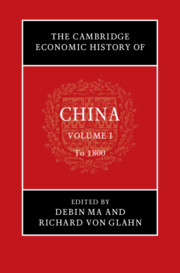Book contents
- The Cambridge Economic History of China
- The Cambridge Economic History of China
- The Cambridge Economic History of China
- Copyright page
- Contents
- Figures
- Maps
- Tables
- Contributors to Volume I
- Acknowledgments
- Note on Citations
- Introduction to Volume I
- Part I Before 1000
- Interlude
- Part II 1000 to 1800
- 7 Ecological Change and Resource Constraints
- 8 Population Change
- 9 Public Finance
- 10 Political Economy
- 11 Law and the Market Economy
- 12 Property Rights and Factor Markets
- 13 The Rural Economy
- 14 Cities and the Urban Economy
- 15 The Monetary System
- 16 Merchants and Commercial Networks
- 17 Foreign Trade
- 18 Production, Consumption, and Living Standards
- Bibliography of Primary Works Cited
- Index
- References
11 - Law and the Market Economy
from Part II - 1000 to 1800
Published online by Cambridge University Press: 07 February 2022
- The Cambridge Economic History of China
- The Cambridge Economic History of China
- The Cambridge Economic History of China
- Copyright page
- Contents
- Figures
- Maps
- Tables
- Contributors to Volume I
- Acknowledgments
- Note on Citations
- Introduction to Volume I
- Part I Before 1000
- Interlude
- Part II 1000 to 1800
- 7 Ecological Change and Resource Constraints
- 8 Population Change
- 9 Public Finance
- 10 Political Economy
- 11 Law and the Market Economy
- 12 Property Rights and Factor Markets
- 13 The Rural Economy
- 14 Cities and the Urban Economy
- 15 The Monetary System
- 16 Merchants and Commercial Networks
- 17 Foreign Trade
- 18 Production, Consumption, and Living Standards
- Bibliography of Primary Works Cited
- Index
- References
Summary
As research over the past few decades, including the studies in this volume, has revealed, there is ample evidence indicating that a vibrant market economy, including highly specialized cash-crop farming, was practiced for sustained periods of time in certain parts of China from the northeastern and southeastern coasts to the Yangzi river delta and valley to the north China plain and the Shanxi plateau between the year 1000 and 1800. This chapter is concerned with the question whether the legal framework of imperial China facilitated or hindered the development of China’s market economy during this period.
Imperial China was largely an agrarian society. Alongside the widespread agricultural activity came the long and winding history of landownership that eventually saw the legal protection of private property rights in land during the Song dynasty (960–1279), which helped regulate economic activity more effectively. The law was highly relevant to the lives of the farming population, as it required the legal establishment of landownership as well as land transfers to family members and non-family members in order to sustain continuity and development in agriculture.
- Type
- Chapter
- Information
- The Cambridge Economic History of China , pp. 419 - 447Publisher: Cambridge University PressPrint publication year: 2022



